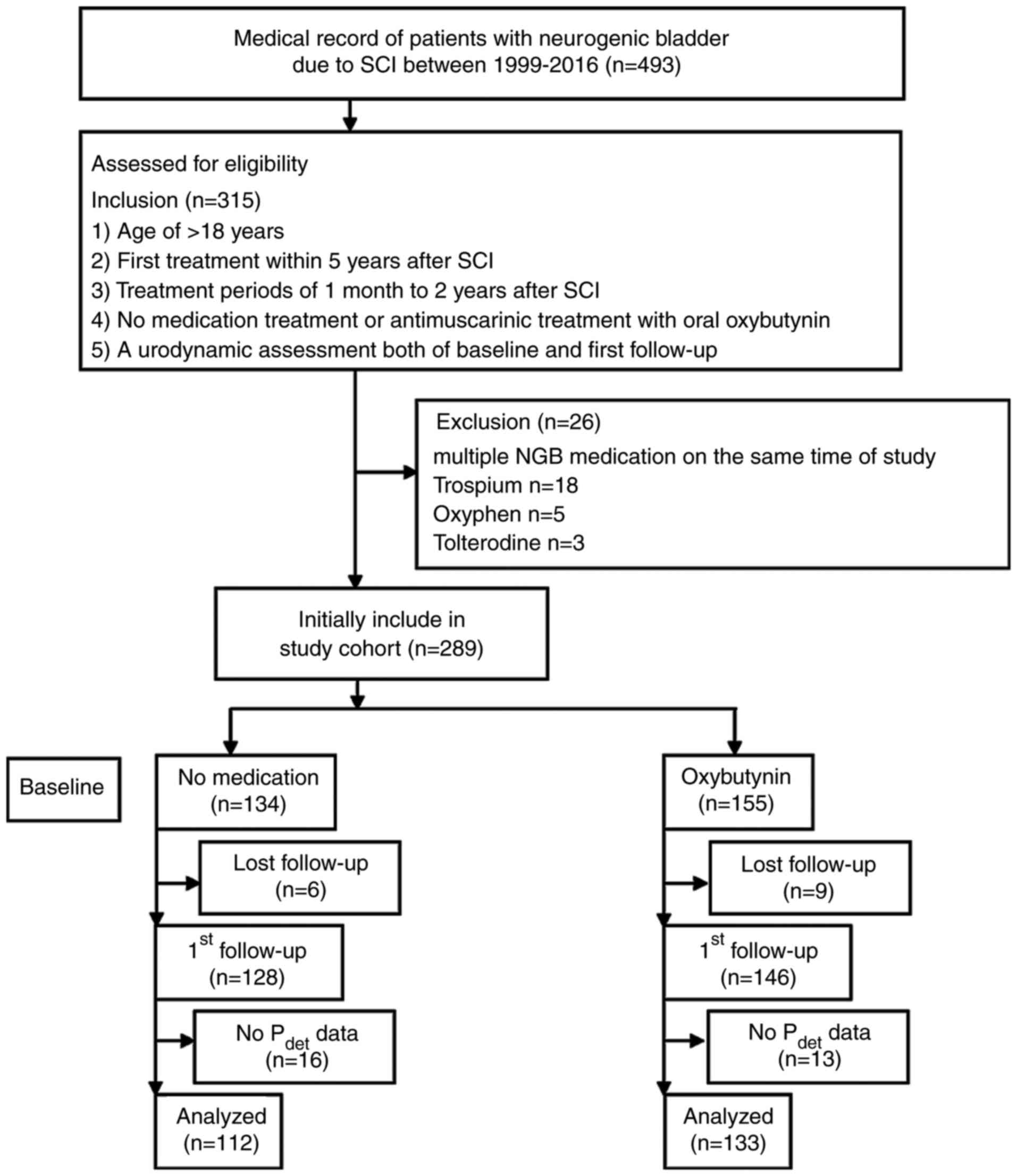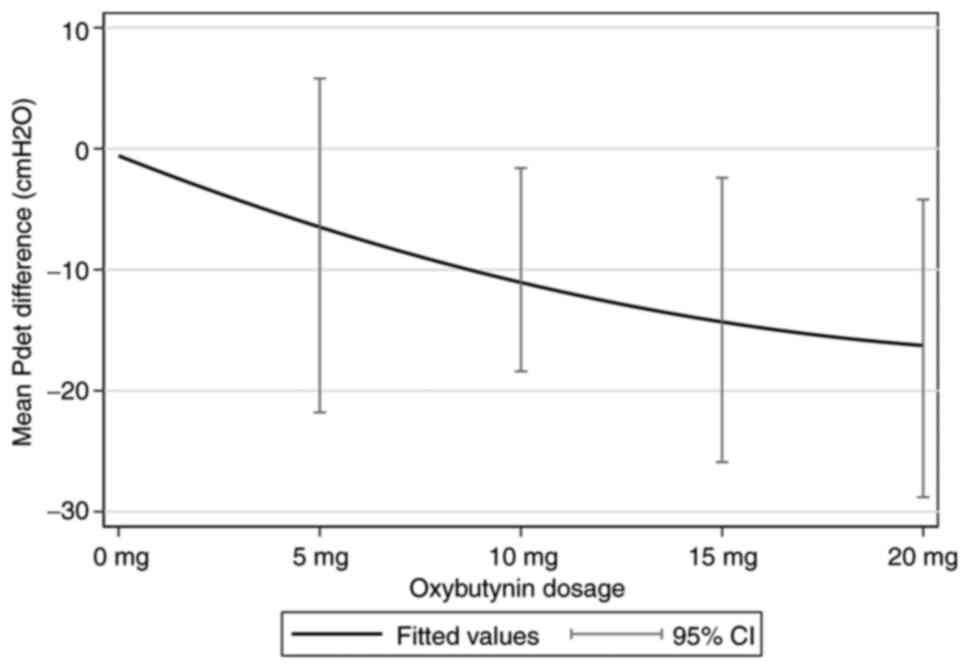|
1
|
Ginsberg D: The epidemiology and
pathophysiology of neurogenic bladder. Am J Manag Care.
19:S191–S196. 2013.PubMed/NCBI
|
|
2
|
Cripps RA, Lee BB, Wing P, Weerts E,
Mackay J and Brown D: A global map for traumatic spinal cord injury
epidemiology: Towards a living data repository for injury
prevention. Spinal Cord. 49:493–501. 2011.PubMed/NCBI View Article : Google Scholar
|
|
3
|
Przydacz M, Denys P and Corcos J: What do
we know about neurogenic bladder prevalence and management in
developing countries and emerging regions of the world? Ann Phys
Rehabil Med. 60:341–346. 2017.PubMed/NCBI View Article : Google Scholar
|
|
4
|
Dorsher PT and McIntosh PM: Neurogenic
bladder. Adv Urol. 2012(816274)2012.PubMed/NCBI View Article : Google Scholar
|
|
5
|
Manack A, Motsko SP, Haag-Molkenteller C,
Dmochowski RR, Goehring EL Jr, Nguyen-Khoa BA and Jones JK:
Epidemiology and healthcare utilization of neurogenic bladder
patients in a US claims database. Neurourol Urodyn. 30:395–401.
2011.PubMed/NCBI View Article : Google Scholar
|
|
6
|
Amarenco G, Ismaël SS, Chesnel C,
Charlanes A and Breton F: Diagnosis and clinical evaluation of
neurogenic bladder. Eur J Phys Rehabil Med. 53:975–980.
2017.PubMed/NCBI View Article : Google Scholar
|
|
7
|
Cameron AP: Medical management of
neurogenic bladder with oral therapy. Transl Androl Urol. 5:51–62.
2016.PubMed/NCBI View Article : Google Scholar
|
|
8
|
Sartori AM, Kessler TM, Castro-Díaz DM, de
Keijzer P, Del Popolo G, Ecclestone H, Frings D, Groen J, Hamid R,
Karsenty G, et al: Summary of the 2024 update of the European
Association of Urology guidelines on neurourology. Eur Urol.
85:543–555. 2024.PubMed/NCBI View Article : Google Scholar
|
|
9
|
Neurogenic Bladder Turkish Research Group.
Yildiz N, Akkoc Y, Erhan B, Gündüz B, Yılmaz B, Alaca R, Gök H,
Köklü K, Ersöz M, et al: Neurogenic bladder in patients with
traumatic spinal cord injury: Treatment and follow-up. Spinal Cord.
52:462–467. 2014.PubMed/NCBI View Article : Google Scholar
|
|
10
|
Szollar SM and Lee SM: Intravesical
oxybutynin for spinal cord injury patients. Spinal Cord.
34:284–287. 1996.PubMed/NCBI View Article : Google Scholar
|
|
11
|
Dwyer J, Tafuri SM and LaGrange CA:
Oxybutynin. In: StatPearls [Internet] Treasure Island (FL),
StatPearls Publishing, 2024.
|
|
12
|
Andersson KE and Chapple CR: Oxybutynin
and the overactive bladder. World J Urol. 19:319–323.
2001.PubMed/NCBI View Article : Google Scholar
|
|
13
|
Madersbacher H, Stöhrer M, Richter R,
Burgdörfer H, Hachen HJ and Murtz G: Trospium chloride versus
oxybutynin: A randomized, double-blind, multicentre trial in the
treatment of detrusor hyper-reflexia. Br J Urol. 75:452–456.
1995.PubMed/NCBI View Article : Google Scholar
|
|
14
|
Stöhrer M, Mürtz G, Kramer G, Schnabel F,
Arnold EP and Wyndaele JJ: Propiverine Investigator Group.
Propiverine compared to oxybutynin in neurogenic detrusor
overactivity-results of a randomized, double-blind, multicenter
clinical study. Eur Urol. 51:235–242. 2007.PubMed/NCBI View Article : Google Scholar
|
|
15
|
Diokno A, Sand P, Labasky R, Sieber P,
Antoci J, Leach G, Atkinson L and Albrecht D: Long-term safety of
extended-release oxybutynin chloride in a community-dwelling
population of participants with overactive bladder: A one-year
study. Int Urol Nephrol. 34:43–49. 2002.PubMed/NCBI View Article : Google Scholar
|
|
16
|
Armstrong EP, Malone DC and Bui CN:
Cost-effectiveness analysis of anti-muscarinic agents for the
treatment of overactive bladder. J Med Econ. 15 (Suppl 1):S35–S44.
2012.PubMed/NCBI View Article : Google Scholar
|
|
17
|
Sirasaporn P and Saengsuwan J: Incidence
and predictive factors for developing vesicoureteric reflux in
individuals with suprasarcral spinal cord injury: A historical
cohort study. Spinal Cord. 59:753–760. 2021.PubMed/NCBI View Article : Google Scholar
|
|
18
|
Abrams P, Cardozo L, Fall M, Griffiths D,
Rosier P, Ulmsten U, Van Kerrebroeck P, Victor A and Wein A:
Standardisation Sub-Committee of the International Continence
Society. The standardisation of terminology in lower urinary tract
function: Report from the standardisation sub-committee of the
international continence society. Urology. 61:37–49.
2003.PubMed/NCBI View Article : Google Scholar
|
|
19
|
Borm GF, Fransen J and Lemmens WA: A
simple sample size formula for analysis of covariance in randomized
clinical trials. J Clin Epidemiol. 60:1234–1238. 2007.PubMed/NCBI View Article : Google Scholar
|
|
20
|
Consortium for Spinal Cord Medicine.
Bladder management for adults with spinal cord injury: A clinical
practice guideline for health-care providers. J Spinal Cord Med.
29:527–573. 2006.PubMed/NCBI
|
|
21
|
De Ruz AE, Leoni EG and Cabrera RH:
Epidemiology and risk factors for urinary tract infection in
patients with spinal cord injury. J Urol. 164:1285–1289.
2000.PubMed/NCBI
|
|
22
|
West DA, Cummings JM, Longo WE, Virgo KS,
Johnson FE and Parra RO: Role of chronic catheterization in the
development of bladder cancer in patients with spinal cord injury.
Urology. 53:292–297. 1999.PubMed/NCBI View Article : Google Scholar
|
|
23
|
Kim YH, Bird ET, Priebe M and Boone TB:
The role of oxybutynin in spinal cord injured patients with
indwelling catheters. J Urol. 158:2083–2086. 1997.PubMed/NCBI View Article : Google Scholar
|
|
24
|
Lam S and Hilas O: Pharmacologic
management of overactive bladder. Clin Interv Aging. 2:337–345.
2007.PubMed/NCBI
|
|
25
|
Sussman D and Garely A: Treatment of
overactive bladder with once-daily extended-release tolterodine or
oxybutynin: The antimuscarinic clinical effectiveness trial (ACET).
Curr Med Res Opin. 18:177–184. 2002.PubMed/NCBI View Article : Google Scholar
|
|
26
|
Chapple C, Khullar V, Gabriel Z and Dooley
JA: The effects of antimuscarinic treatments in overactive bladder:
A systematic review and meta-analysis. Eur Urol. 48:5–26.
2005.PubMed/NCBI View Article : Google Scholar
|
|
27
|
Harvey MA, Baker K and Wells GA:
Tolterodine versus oxybutynin in the treatment of urge urinary
incontinence: A meta-analysis. Am J Obstet Gynecol. 185:56–61.
2001.PubMed/NCBI View Article : Google Scholar
|
|
28
|
Shen SH, Jia X, Peng L, Zeng X, Shen H and
Luo DY: Intravesical oxybutynin therapy for patients with
neurogenic detrusor overactivity: A systematic review and
meta-analysis. Int Urol Nephrol. 54:737–747. 2022.PubMed/NCBI View Article : Google Scholar
|
|
29
|
Amend B, Hennenlotter J, Schafer T,
Horstmann M, Stenzl A and Sievert KD: Effective treatment of
neurogenic detrusor dysfunction by combined high-dosed
antimuscarinics without increased side-effects. Eur Urol.
53:1021–1028. 2008.PubMed/NCBI View Article : Google Scholar
|
|
30
|
Pannek J, Sommerfeld HJ, Botel U and Senge
T: Combined intravesical and oral oxybutynin chloride in adult
patients with spinal cord injury. Urology. 55:358–362.
2000.PubMed/NCBI View Article : Google Scholar
|
|
31
|
Hadiji N, Previnaire JG, Benbouzid R,
Robain G, Leblond C, Mieusset R, Enjalbert M and Soler JM: Are
oxybutynin and trospium efficacious in the treatment of detrusor
overactivity in spinal cord injury patients? Spinal Cord.
52:701–705. 2014.PubMed/NCBI View Article : Google Scholar
|
















